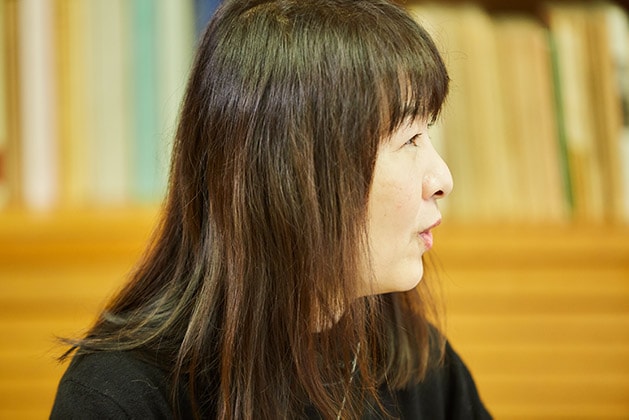
- Semiconductor Technology Now
Cross Talk
Do extra-terrestrials exist?
 |
Mie Nagata: Extra-terrestrials? Wow! But do you personally believe in the existence of extra-terrestrials (extraterrestrial intelligent life forms)?
Mareki Honma: Yes, I do. Believing in extra-terrestrials makes things more interesting, but I also believe it’s possible that we will someday discover beings on another Earth-like planet.
In fact, the 2019 Nobel Prize in physics was just won for work involving the discovery of a planet outside our solar system. This exoplanet was discovered in 1995, when I was still studying at university. Until that point, our solar system was the only known planetary system, so I was really surprised to learn that planets surrounded other stars as well. Since then, about 4,000 exoplanets have been discovered. Although we still haven’t discovered an exoplanet like Earth, the day will come when we will have identified a “second Earth.”
To start with, there are an infinite number of stars in this universe, with several planets around them, so I find it difficult to believe that the Earth is unique among those astronomical objects.
Mie Nagata: What would you do if you met an extra-terrestrial?
Mareki Honma: I would like them to tell me about the universe. If extra-terrestrials actually traveled from the distant reaches of space to visit us on Earth, their levels of science and technology would far exceed ours, so they would certainly know lots about the universe. They might also be able to see into black holes as well.
Mie Nagata: During my lectures at the planetarium, visitors often ask whether, if extra-terrestrials existed, would they be good or evil beings? I tell them that any being that went to all the trouble of coming here from the distances of space would certainly be good. What do you think?
Mareki Honma: Hmmm. That’s difficult to answer. For example, our sun is expected to burn out in about five billion years from now, so life could no longer exist on Earth. If that happens, mankind might want to migrate to another star. Even though our only intention might be to enable mankind to survive, we might be viewed as invaders by those inhabitants.
However, if beings from another planet could actually come to Earth, they would probably have hundreds of millions, or even billions, of years of civilization, science and technologies behind them, so I think they would be peaceful beings. Looking at it from the opposite direction, if they were not peaceful, it is unlikely that they would have built such a long-lasting civilization.
Mie Nagata: You could say the same about human beings. With environmental concerns, an exploding population, and many other problems that we need to solve, and the understanding that our sun will burn out as soon as five billion years from now, we need to identify ways of working in unity to overcome those crises rather than fighting amongst ourselves.
Mareki Honma: That’s right. That is also an extremely important perspective when thinking about the existence of extra-terrestrials. If earthlings could still be around in five billion years, it is feasible that other beings could also survive for that long, so the universe could be full of extra-terrestrials. However, if earthlings became extinct in a thousand years, and other beings followed the same evolution of intelligence and civilization as earthlings, then they too would only live for about that long, which would minimize the opportunity for us to meet each other. Conversely, if we find lots of extra-terrestrials, it might indicate that earthlings could also live for hundreds of millions, or billions, of years. But if we don’t find them, then the future might be bleak for earthlings.
In other words, finding out whether extra-terrestrials exist, and if so how many of them there are, is indirectly like predicting the future of mankind.
Hopes for the future: Can we all have the same dream?
 |
Mie Nagata: The question of whether mankind can unite is certainly important, isn’t it? With the capturing of an image of this black hole as well, the only reason we achieved such a remarkable result is because the astronomers of the world cooperated with each other. One hundred and twenty years ago, countries around the world, including people here at the Mizusawa campus of the National Astronomical Observatory of Japan, also came together to study variation of the Earth’s latitude. When studying astronomy, you can see many examples of such multi-national, multi-racial collaborations at work. Therefore, in answer to the question of whether mankind can unite, I have an optimistic outlook. Professor Honma, how were you and your colleagues able to cooperate?
Mareki Honma: First of all, leaders are important. With the EHT project, we had a leader in America who oversaw the entire project. In fact, it was thanks to his leadership that the project succeeded.
More important, though, was that we all had the same dream. The reason that we achieved our goal of successfully imaging the black hole was that all 120 of us were united in our desire to see a black hole one way or another. No matter how perfect our leader was though, we would have abandoned our project if we did not all have that same dream. What I learned from my participation in the EHT project is that having a dream in common, and sharing a common goal, is important for teamwork.
Mie Nagata: It is a fantastic thing to have people gather and cooperate regardless of country or race, and in the face of wars and conflicts, in hope of finding the answer to a single problem.
Mareki Honma: Yes, because our opponent is the universe. Viewed from space, the Earth is just a dot. But the extra-terrestrials must laugh at us fighting over national borders drawn across that dot. It is important for us to open our minds and live in peace. I believe our mission is to provide that “universal perspective.”
Mie Nagata: We received many, many questions about black holes this year (2019) from children and planetarium visitors. Actually, black holes are not mentioned in text books, but the children all know about them. That means that there was a huge number of people who listened to the news with interest. I think it also shows the ambition of people like yourself to gather from around the world and collaborate to solve mysteries and problems from a broad perspective.
Mareki Honma: If children like that want to become researchers in astronomy and other sciences, then I am confident that the world will become a better place in the future.



















